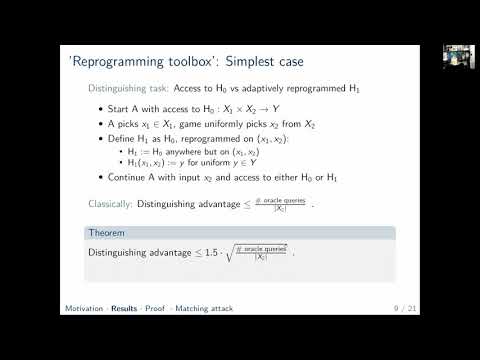CryptoDB
Tight adaptive reprogramming in the QROM
| Authors: |
|
|---|---|
| Download: | |
| Conference: | ASIACRYPT 2021 |
| Abstract: | The random oracle model (ROM) enjoys widespread popularity, mostly because it tends to allow for tight and conceptually simple proofs where provable security in the standard model is elusive or costly. While being the adequate replacement of the ROM in the post-quantum security setting, the quantum-accessible random oracle model (QROM) has thus far failed to provide these advantages in many settings. In this work, we focus on adaptive reprogrammability, a feature of the ROM enabling tight and simple proofs in many settings. We show that the straightforward quantum-accessible generalization of adaptive reprogramming is feasible by proving a bound on the adversarial advantage in distinguishing whether a random oracle has been reprogrammed or not. We show that our bound is tight by providing a matching attack. We go on to demonstrate that our technique recovers the mentioned advantages of the ROM in three QROM applications: 1) We give a tighter proof of security of the message compression routine as used by XMSS. 2) We show that the standard ROM proof of chosen-message security for Fiat-Shamir signatures can be lifted to the QROM, straightforwardly, achieving a tighter reduction than previously known. 3) We give the first QROM proof of security against fault injection and nonce attacks for the hedged Fiat-Shamir transform. |
Video from ASIACRYPT 2021
BibTeX
@inproceedings{asiacrypt-2021-31480,
title={Tight adaptive reprogramming in the QROM},
publisher={Springer-Verlag},
doi={10.1007/978-3-030-92062-3_22},
author={Alex B. Grilo and Kathrin Hövelmanns and Andreas Hülsing and Christian Majenz},
year=2021
}

